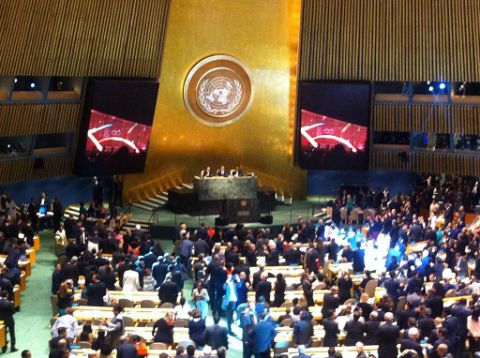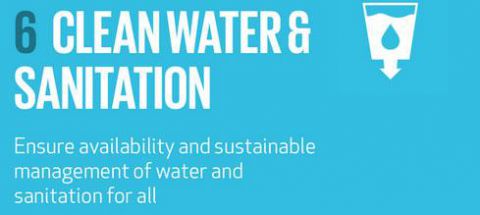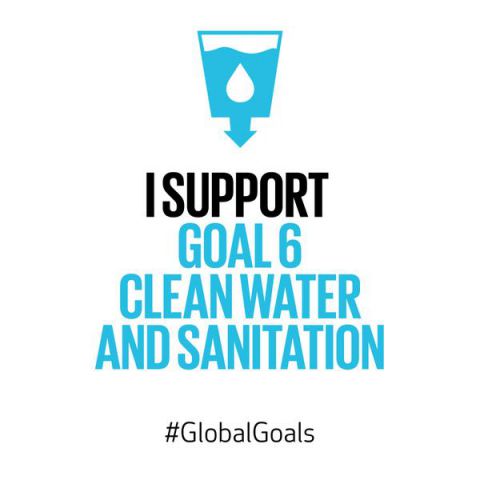Celebrate the global goals, but now is the time for all of us to work together!
Blog written ahead of the United Nations Sustainable Development Summit by Nathalie Seguin, General Coordinator, Freshwater Action Network Mexico (FAN-Mex), 24 September 2015

Hours spent going through airports and customs, closed streets full of New York city cops, queues of people waiting in snaking lines to enter a building. But all of this mess is for a good reason: today we will have the official adoption of the post-2015 agenda at the United Nations’ Sustainable Development Summit. We celebrate the recognition of a specific goal for water and sanitation, and the mention of hygiene in one of the targets.
Today, all Member States will open the UN General Assembly to adopt this progressive, ambitious agenda, also known as the 2030 Agenda. For those who have never heard about it, this is the second part of a development agenda that started through the adoption of the Millennium Development Goals (MDGs). As the deadline for those goals is about to be reached at the end of this year, a new agenda had to created.
However, this could not be just an extension of the current commitments. The MDGs revealed many deficiencies and systemic problems, and many countries failed to achieve several of the goals. Human rights were not included adequately across the agenda. The office of the High commissioner of Human Rights has even stated as much; “[the MDGs] were not adequately aligned with human rights and did not give sufficient attention to discrimination and inequalities”. There was also a lack of an integrated and sustainable approach to solutions proposed in the MDGs. These previous goals did little to improve the actual health and nutrition, and living and working conditions of communities- rather, in many cases, it was worsening their reality, especially those living in the most marginalised conditions.
But that was not the only problem. The 15 years of experience through the MDGs revealed other systemic problems: a clear lack of appropriation of this agenda by citizens themselves, and also by local authorities. This lack of ownership was evidence by the lack of participation and inclusion of citizens and local authorities in the design and implementation of programmes aiming to achieve the MDGs. This is why we, civil society organisations, have been advocating for participation, inclusiveness, and the inclusion of human rights language as essential to achieve sustainable development of our finite planet.
Efforts made over the past few years have been major. In terms of water and sanitation, these were only part of the sustainability goal 7 of MDGs, and lack sufficient focus and prioritisation. While we were implementing water, hygiene and sanitation projects, we started evaluating the processes and results, in order to build evidenced-based advocacy on what the new agenda would need. This was part of civil society’s strategy to input on what was called the Open Working Group. These multi-stakeholder working groups had the mandate to discuss and agree on a first draft for this future Sustainable Development agenda.
This has been an historic process that was actually very participatory, and allowed governments to develop a very advanced document, based on consensus before starting the negotiations. The final outcome of agenda 2030 represents a product of intense participation of all countries for the last years; not only at government level, but inclusive of a multiplicity of social actors that helped to build this agenda.
In particular, within the water sector, End Water Poverty, as a global coalition of regional and national members, have played an important role in insisting on the inclusion of a specific target for water and sanitation. We have also amplified the call for the inclusion of access to sanitation and hygiene as essential in the goals, to be as important as access drinking and safe water. Furthermore, we’ve been involved in participating in the interactive dialogues with civil society in the first 6 months of this year. Freshwater Action Network- Mexico (FAN- Mex) was selected twice to speak, and did so on behalf of our global FAN network, but also voicing EWP advocacy messages on goal 6, targets and indicators.

Today we are very glad to finally see a specific goal (goal 6) on water, sanitation and hygiene, as well as a target addressing universal, affordable and equitable access to drinking water for all. We also welcome the separate target to achieve equitable, adequate access to sanitation. Most important an achievement is the mention of access to hygiene, with special attention on women and girls needs and vulnerable groups.
Of course we cannot shout full success yet, particularly as there are large threats to water if goal 7 on access to energy is not well framed on the indicators. There is still a very important process to happen to set adequate indicators. Progressive indicators will be critical to ensure interlinkages that are essential to such an integrated agenda, and we must still push that these indicators are truly people-centered. These indicators must focus on the actual improvement of people’s quality of life, especially the most marginalised groups. We need to look further than just measuring services that simple fulfil governments’ quotas, and ensure that these systematically truly improve people’s quality of life.
As Pablo Yañes , Economic Commission for Latin America and the Caribbean (ECLAC) representative in Mexico said in a panel from our national NGO process ahead of the Summit, “after the Summit, we all have to strap on our seat belts, as the most difficult part is about to start.” The agenda itself is an action plan for the people and cannot be adequately implemented without the people. It would neither acquire real national meaning nor legitimacy, if once adopted formally by Member States during the Summit, civil society doesn’t have a relevant participation role. Implementation of the agenda for 2030 must be a process that ensures dialogue and discussion with citizens, civil society and academia. It will be fundamental to foster not just a governmental policy, but inclusive policies for all, by all.
But for now, let’s take a big breath, and celebrate what has been achieved so far! No one left behind!
